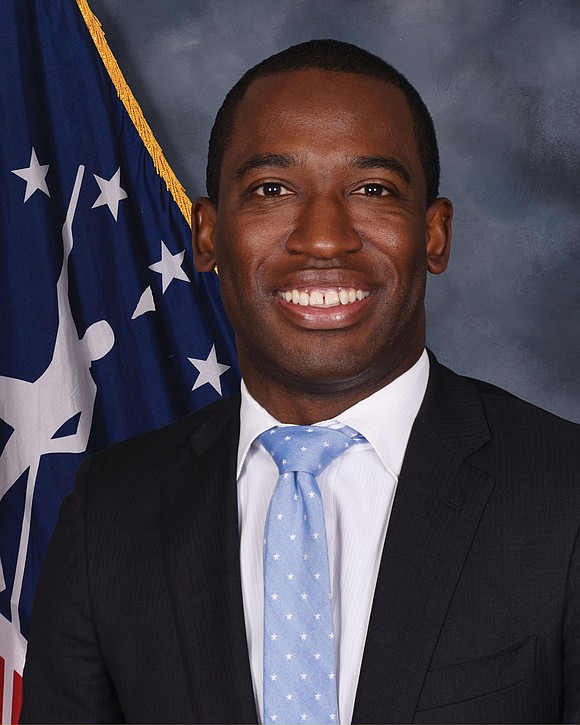Mayor Stoney unveils a $1.92 billion budget plan for 2020-21
Jeremy M. Lazarus | 3/13/2020, 6 a.m.
Mayor Levar M. Stoney wants to increase total city spending an additional $135 million — or nearly $600 per resident — to beef up investments in street paving, public education, city worker pay, affordable housing and other priorities.
Mayor Stoney laid out his plans in presenting to City Council last Friday his proposed $1.92 billion budget package for the 2020-21 fiscal year that starts July 1.
The proposal is a 7.6 percent increase over the city’s current $1.78 billion budget.
With a heated city real estate market continuing to pump more revenue into city coffers, and with the city set to benefit from regional increases in taxes on purchases and gas, Mayor Stoney, who is heading for re-election, did not include a request for any increase in property taxes.
However, the budget proposal calls for additional increases in utility rates, which has concerned several City Council members worried that water and sewer service is becoming too expensive.
Top items in the mayor’s proposal include:
• Doubling spending on street paving to an unprecedented $30 million as part of a five-year plan to resurface most city streets and $2 million to replace or install sidewalks — a top issue for many.
The city is benefiting from a General Assembly-approved plan to increase sales and gas taxes in the Richmond area to boost funding for roads and public transit. The city is projected to gain $25 million, with the mayor seeking to use $15 million on paving, adding to $15 million the city would spend from its resources.
• Increasing spending on public school operations by $17 million to enable Rich- mond Public Schools to undertake the second phase of its five-year improvement plan called Dreams4RPS. That amount would be on top of the $18.5 million provided this year.
• Providing a 2 percent pay increase for most city employees, while increasing starting pay for police and firefighters by $1,000 and funding a step increase for veterans.
Mayor Stoney also is proposing to spend $330,000 as part of a three-year effort to improve pay for public defenders, who represent most of the criminal defendants in city courts.
He also is proposing to invest an additional $2.1 million in the city’s Affordable Housing Trust Fund to help expand the number of units, and to spend $667,000 to beef up Richmond’s pioneering eviction diversion partnership with Housing Opportunities Made Equal. HOME has aided 121 families to avoid losing their homes.
Mayor Stoney’s plan also calls for hiring additional city employees to maintain trees, install sidewalks and handle service requests.
The Richmond Voter Registrar’s Office would be another big winner, with the mayor proposing to boost spending by $1.7 million to enable the office to relocate its operations from City Hall.
There are losers in the budget plan, too. That includes GRTC, whose city subsidy would be slashed by 50 percent to $7.9 million. While a new regional transit authority is to replace the money, bus company of- ficials have said the mayor’s decision would likely prevent GRTC from cutting fares or boosting service on its regular routes. While hailing his proposal to increase spending on RPS operations, the mayor did not mention that his budget package would slash spending on maintenance of existing school buildings from the $19 million provided this year to $4 million, a retreat that would leave a majority of existing building needs unmet.
City Councilwoman Kim B. Gray, 2nd District, who is challenging the mayor in the November election, expressed concern about the mayor’s proposal to provide another significant increase for RPS “without any evidence that the money we are spending is generating the promised improvements.”
She also expressed concern the mayor’s proposal does not include any efficiencies to reduce spending in any area and noted Mayor Stoney’s plan would add employees to the Department of Public Works when the department has a considerable number of vacant positions.
However, with a tax increase off the table, the proposal to raise utility rates garnered the most attention.
The proposed rate increases dismayed 8th District Councilwoman Reva Trammell. She said that residents on a fixed income can only pay so much, and the price of service is starting to hit their ceiling.
Questions about the need for the increase were fueled by the mayor’s budget summary for the Department of Public Utilities. That summary shows the cost of utility operations has jumped $700 per person since he took office, rising from $1,760 per city resident in 2018 to a proposed $2,476 per resident in fiscal 2021.
Council Vice President Chris A. Hilbert noted that even if the cost of utilities goes up only a modest 2 percent a year, that still means a significant increase after 20 years.







